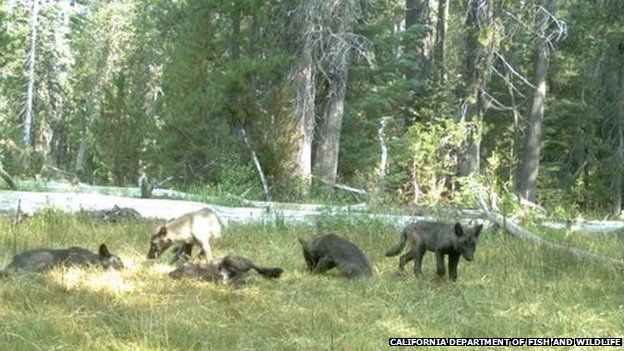Wolf pack sighting could signal comeback in California
- Published

A pack of wolves has been spotted in Northern California for the first time in nearly 100 years.
The appearance of the five grey wolf pups and two adults could signal a return of the animals, which have not been found in the state since 1924.
California Department of Fish and Wildlife first discovered the pack this month in Siskiyou County near the Oregon border using a remote camera.
The wolves have been named the "Shasta Pack" after a nearby mountain.
"This news is exciting for California," Charlton Bonham of the California Department of Fish and Wildlife said on Thursday. "We knew wolves would eventually return home to the state and it appears now is the time."
State officials spotted a lone adult wolf earlier this year They believe the same wolf is associated with the newly spotted ones because of where it was photographed.
Another lone wolf made headlines in 2011 when the animal wandered into California from Oregon.
Wolves were almost hunted to extinction in the late 19th and early 20th centuries in western US states by hunters and ranchers who sought to protect their livestock.
In 1995, federal officials reintroduced wolves into Yellowstone National Park and since then the animals have spread to neighbouring states.
Karen Kovacs of the California Department of Fish and Wildlife said the migration to Northern California is an amazing accomplishment only 21 years after the wolves were reintroduced to the Northern Rocky Mountains.
California has considered gray wolves an endangered species since 1973, making it illegal to kill or trap them.
Officials are soon to release a Wolf Management Plan and are encouraging the public to report information about wolf sightings in the state.
Wolves do not pose a "direct threat to human safety," officials said, but they recommended people do not approach or feed them.
- Published23 December 2014